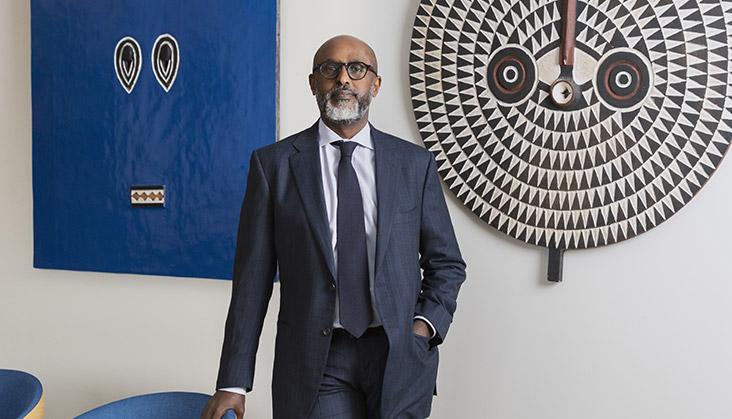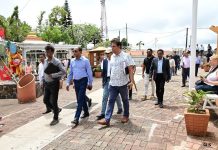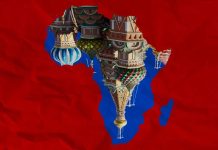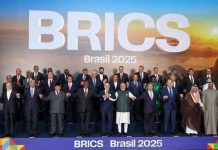Africa-Press – Mauritius. Transparency, debt, investments. . . The director of the Africa Department of the International Monetary Fund analyses the relationship between the Washington institution and the continent.
He is entering his sixth year as ‘Mr. Sub-Saharan Africa’ at the IMF. Asked on the sidelines of the annual meetings in October, Abebe Aemro Selassie, who joined the institution in 1994, emphasises the IMF’s role in the region’s resilience.
The result is a growth forecast of 3.7% for 2021 and 3.8% for 2022. However, Africa remains the least vaccinated of continents and the most vulnerable. Hence the need, says the Ethiopian, to be more demanding on the implementation of development policies.
The latest IMF report on sub-Saharan Africa, published in October, sounds the alarm on the growing gap between the development trajectories of countries.
Can this trend be reversed? Abebe Aemro Selassie: These divergences, which existed before the Covid-19 pandemic, have increased with the crisis. That said, I am convinced that we can change the situation.
On the one hand, the continent has already shown, in the past, its great resilience. On the other hand, the demographic and growth dynamics confirm an enormous potential for transformation.
To achieve this, two elements are crucial: ensuring that the public policies put in place meet the identified needs, and maintaining external financial support to give countries the means to act.
Has this support been commensurate with Africa’s needs? The IMF has responded and played its role as a financial safety net in many countries. I am very proud of that.
Being there when needed is what the Fund is all about. We are a long way from the days of structural adjustment plans… Africa has changed, and so has the IMF! This is normal.
Our desire is to remain a trusted advisor to each of our member countries. In most cases, relations are very cordial. While the IMF’s financial support is widely welcomed, it is also questioned.
In Nairobi, a ‘Stop loaning Kenya’ movement has emerged. How do you explain this? The countries of the zone are in a complicated situation, torn between contradictory budgetary injunctions.
They have to spend more to meet development needs, while at the same time controlling their growing debt and struggling to increase tax revenues. Hence, there is some reluctance to take on new loans.
However, it is impossible to limit spending: we cannot do without vaccines against Covid-19 or, for example, suspend support for SMEs. On the subject of tax revenues, an internal policy issue par excellence, we provide advice and expertise when called upon.
In this constrained context, there is one point on which we must make progress: ensuring that we invest in the most relevant projects that produce the maximum results.
The question of transparency in the use of funds also arises. In Cameroon, management of Covid-19 funds has given rise to suspicions of misappropriation…
The IMF director was very clear in June 2020. She enjoined to “spend as much as possible” but also to “keep the receipts well”. This appeal applies to all countries.
More than ever, the Fund is mobilised on the subject. We have recommended strengthening audit institutions and supported countries that have tried to strengthen transparency measures.
For example, with the obligation to disclose the identity of company owners in the context of calls for tender. The IMF has also recommended that countries strengthen their justice systems.
Should investment priorities be reviewed? In the past, there has been a strong focus on infrastructure. In the current context and in the future, with the pressure of the impact of climate change, priority will be given to the social component.
For example, the amounts allocated to each country in the recent Special Drawing Rights (SDR) issue must be directed to immunisation and health systems to benefit the most vulnerable. Access to vaccines in Africa is critical to avoid a surge in cases and ensure a robust recovery.
Since May and the holding of a summit in Paris on the financing of African economies, there has also been talk of reallocating part of the funds from developed countries to developing countries, and in particular to the continent.
Where do we stand? We are working on this. The reallocation could take place in three ways, which are currently under discussion. First, the funds could be added to an existing IMF facility for low-income countries, the Poverty Reduction and Growth Trust.
Second, they could feed into a new fund, which is being established, providing long-term financing focused on climate change, for example. Third, we welcome the announcements by several countries with strong external positions on a voluntary transfer of SDRs to poorer and more vulnerable countries.
France, for example, has committed to redistribute 20% of its SDRs. Debt management is another thorny issue. While the debt service suspension mechanism ends at the end of the year, a ‘common framework’ has been launched, under the aegis of the G20, and requested by three countries – Chad, Ethiopia and Zambia.
Is this enough? The implementation of this global architecture, which will allow debt restructuring in case of difficulties, must be highlighted. This is a real step forward. That said, much remains to be done to make this framework as effective as possible.
For More News And Analysis About Mauritius Follow Africa-Press







